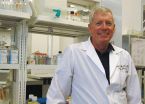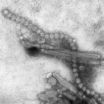(Press-News.org) PROVIDENCE, R.I. [Brown University] — A new study pinpoints working memory as a source of learning difficulties in people with schizophrenia.
Working memory is known to be affected in the millions of people – about 1 percent of the population – who have schizophrenia, but it has been unclear whether that has a specific role in making learning more difficult, said study lead author and Brown University postdoctoral researcher Anne Collins.
"We really tend to think of learning as a unitary, single process, but really it is not," said Collins, who along with Brown Professor and co-author Michael Frank in 2012 developed an experimental task and a computational model of cognition that can distinguish the contributions of working memory and reinforcement in the learning process. "We thought we could try to disentangle that here and see if the impairment was in both aspects, or only one of them."
In the new study in the Journal of Neuroscience, cognitive scientists Collins and Frank collaborated with schizophrenia experts James Waltz and James Gold of the University of Maryland, to measure the effects of working memory and reinforcement in learning by applying these methods. They found that only working memory was a source of impairment.
Learning about learning's components
To find that out, they marshaled 49 volunteers with schizophrenia and an otherwise comparable set of 36 people without the condition to participate in the specially designed learning task. In each round, participants were shown a set of images and then were asked to push one of three buttons when they saw each image. With each button push they were told whether they had hit the correct button for that image. Over time, through trial and error, participants could learn which picture called for which button. With perfect memory, one wouldn't need to see an image more than three times to learn the right button to push when it appeared.
The task therefore explicitly involves employing the brain's systems for working memory (keeping each image – button association in mind) and for reinforcement learning (wanting to repeat an action that led to the feedback of "correct", and to avoid one that produced "incorrect"). But in different rounds while the degree of reinforcement remained the same, the experimenters varied the number of images in the sets the volunteers saw, from 2 to 6. What varied, therefore, was the degree to which working memory was taxed.
What the researchers found was that for both people with schizophrenia and for controls, the larger the image set size, the more trials it took to learn to press the correct button consistently for each image and the longer it took to react to each stimulus. People with schizophrenia generally performed worse on the task than healthy controls.
Those results show that as the task involved more images, it became harder to do – a matter of working memory, since the capacity to maintain information explicitly in memory is limited – but that alone didn't prove that working memory was a source of learning problems for people with schizophrenia: they could also be doing worse because of a slower use of the reinforcement.
To determine that, the researchers used their computational models of how learning occurs in the brain to fit the experimental data. They asked what parameters in the models needed to vary to accurately predict the behavior they measured in people with and without schizophrenia.
That analysis revealed that varying parameters of working memory, such as capacity, but not parameters of reinforcement learning, accounted best for differences in behavior between the groups.
"With model-fitting techniques, I can look quantitatively, trial-by-trial and see that the model predicts subject's choices," she said. "The same model explains both the healthy group and the patient group, but with differences in parameters."
That confirmed that working memory uniquely affected learning in people with schizophrenia, while reinforcement learning mechanisms did not, Collins said.
The study suggests that working memory could be a more important target than reinforcement learning among researchers and clinicians hoping to help improve learning for people with schizophrenia, Collins said.
Among mentally healthy people, as well, the study illustrates that the different components of learning can be understood individually, even as they all interact in the brain to make learning happen.
"More broadly it brings attention to the fact that we need to consider learning as a multiactor kind of behavior that can't be just summarized by a single sytem," Collins said. "It's important to design tasks that can separate them out so we can extract different sources of variance and correctly match them to different neural systems."
INFORMATION:
The National Institute of Mental Health supported the research (grant: R01MH080066-01).
Working memory hinders learning in schizophrenia
2014-10-08
ELSE PRESS RELEASES FROM THIS DATE:
NIST quantum probe enhances electric field measurements
2014-10-08
VIDEO:
This is an animation of NIST's new method for measuring electric field strength based on the quantum properties of atoms. The technique works for abroad range of frequencies, 1-500 gigahertz,...
Click here for more information.
Researchers at the National Institute of Standards and Technology (NIST) and the University of Michigan have demonstrated a technique based on the quantum properties of atoms that directly links measurements of electric field strength to the International ...
Researchers pump up oil accumulation in plant leaves
2014-10-07
UPTON, NY - Increasing the oil content of plant biomass could help fulfill the nation's increasing demand for renewable energy feedstocks. But many of the details of how plant leaves make and break down oils have remained a mystery. Now a series of detailed genetic studies conducted at the U.S. Department of Energy's (DOE) Brookhaven National Laboratory and published in The Plant Cell reveals previously unknown biochemical details about those metabolic pathways-including new ways to increase the accumulation of oil in leaves, an abundant source of biomass for fuel production.
Using ...
JAMA findings reveal vaccine approach to fight pandemic bird flu
2014-10-07
ST. LOUIS -- A vaccine that protects against an old strain of avian flu primes the immune system to mount a rapid response when a vaccine designed to protect against a related but different and new strain of avian flu is given a year later, according to Saint Louis University research findings reported in JAMA.
In addition, when combined with an adjuvant, which is a chemical that stimulates the immune system to produce more antibodies, a lower dose of the new avian flu vaccine worked better in triggering an immune response than a stronger dose without adjuvant. That means ...
Antimicrobial use in hospitals appears to be common
2014-10-07
A one-day prevalence survey of 183 hospitals found that approximately 50 percent of hospitalized patients included in the survey were receiving antimicrobial drugs, and that about half of these patients were receiving 2 or more antimicrobial drugs, according to a study in the October 8 JAMA, a theme issue on infectious disease. Most antimicrobial use was for infection treatment.
Despite the evidence supporting early, appropriate antimicrobial therapy, a substantial proportion of antimicrobial use in U.S. acute care hospitals may be inappropriate, based on factors such ...
Studies examine vaccination strategies for prevention, control of avian flu
2014-10-07
Two randomized trials in the October 8 issue of JAMA examine new vaccination strategies for the prevention and control of avian influenza, often referred to as "bird flu." This is a theme issue on infectious disease.
In one study, Mark J. Mulligan, M.D., of the Emory University School of Medicine, Atlanta, and colleagues compared the safety and antibody responses (immunogenicity) of different doses of influenza A/Shanghai/2/13 (H7N9) vaccine mixed with or without the MF59 adjuvant (a component that improves immunogenicity and enhances efficacy of inactivated influenza ...
E. coli outbreak at hospital associated with contaminated specialized GI endoscopes
2014-10-07
Despite no lapses in the disinfection process recommended by the manufacturer being identified, specialized gastrointestinal endoscopes called duodenoscopes had bacterial contamination associated with an outbreak of a highly resistant strain of E coli at a hospital in Illinois, according to a study in the October 8 JAMA, a theme issue on infectious disease.
The duodenoscope is different than that used for routine upper gastrointestinal endoscopy or colonoscopy. The procedure associated with these specialized scopes is endoscopic retrograde cholangiopancreatography (ERCP), ...
Tobacco use associated with increased risk of oral HPV-16 infection
2014-10-07
Study participants who reported tobacco use or had higher levels of biomarkers of tobacco exposure had a higher prevalence of the sexually transmitted infection, oral human papillomavirus type 16 (HPV-16), according to a study in the October 8 JAMA, a theme issue on infectious disease.
Oral HPV-16 is believed to be responsible for the increase in incidence of oropharyngeal squamous cell cancers in the United States. An association between self-reported number of cigarettes currently smoked per day and oral HPV prevalence has been observed, according to background information ...
Researchers find link between tobacco use and viral infection that causes oral cancers
2014-10-07
Johns Hopkins scientists have shown a strong association between tobacco use or exposure and infection with oral human papillomavirus type 16 (HPV16), the sexually transmitted virus responsible for mouth and throat cancers worldwide. The numbers of such cancers have increased 225 percent in the United States over the past two decades.
HPV16 is found in 80 percent of cancers located in the back of the throat and is transmitted through oral sex. "The practice of oral sex is common, but this cancer is rare. So there must be cofactors in the process that explain why some ...
It's time to fight sepsis like we fight heart attack, UM researchers say
2014-10-07
ANN ARBOR, Mich. — A decade ago, America's health care community took on heart attacks with gusto, harnessing the power of research and data to make sure that every patient got the best possible care.
It worked: Death rates for heart attack have dropped. The same has happened with heart failure and pneumonia. Now, say a pair of University of Michigan Medical School experts, it's time to do the same for sepsis.
Sepsis may not have the same name recognition as heart attacks -- but it now affects more hospital patients, and leads to more hospital costs, than any ...
Candidate H7N9 avian flu vaccine works better with adjuvant
2014-10-07
An experimental vaccine to protect people against H7N9 avian influenza prompted immune responses in 59 percent of volunteers who received two injections at the lowest dosage tested, but only if the vaccine was mixed with adjuvant—a substance that boosts the body's response to vaccination. Without adjuvant, immune responses produced by the investigational vaccine were minimal regardless of vaccine dosage, according to findings from a clinical trial sponsored by the National Institute of Allergy and Infectious Diseases (NIAID), part of the National Institutes of Health.
The ...




